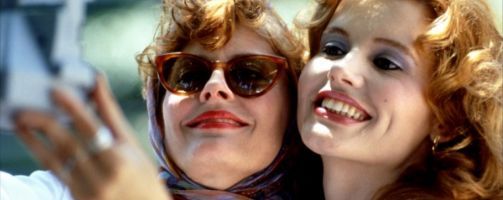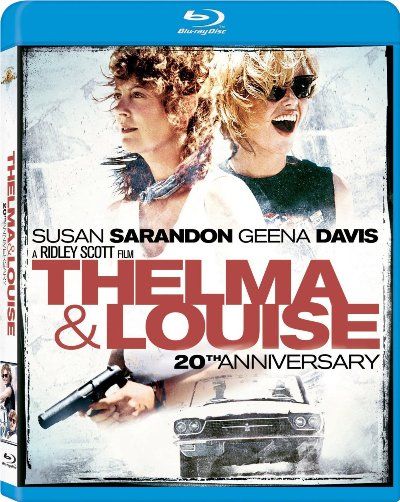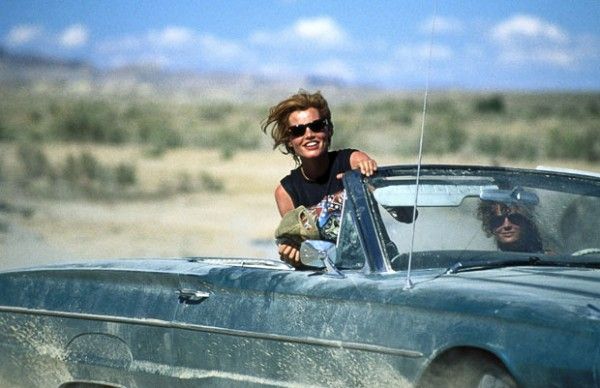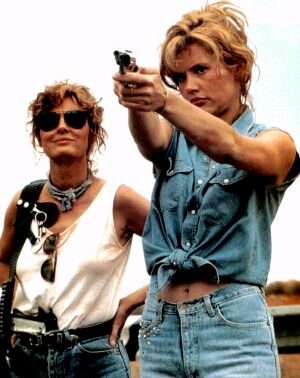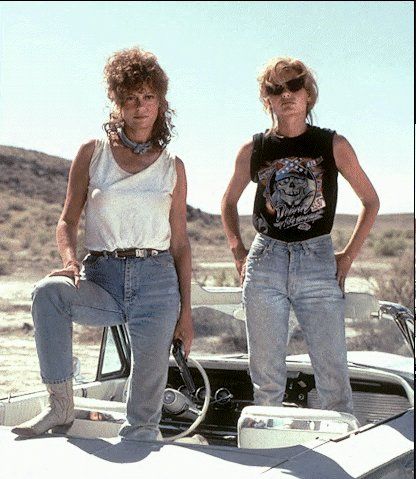Thelma and Louise is 20 years old, and to celebrate, 20th Century Fox has released a 20th anniversary edition of Ridley Scott's epic female-empowerment movie. Despite the fact that Thelma and Louise is part of the pop culture vernacular, I'd never actually sat down and watched the film from beginning to end. Would Thelma and Louise live up to two decades worth of hype? Would its iconic ending be as effective in 2011 as it was in the early 90's? Would Brad Pitt deliver a butt-shot? Find out the answers to all of these questions after the jump:
We've all heard of Ridley Scott's Thelma and Louise, but how many of us have ever actually sat down and watched the film? I conducted an informal poll prior to watching the movie, texting around to a few fellow movie geeks to see who'd made the effort: of the ten people I contacted, only one had seen Thelma and Louise, though almost everyone said they knew A) how it ended and B) that Brad Pitt's naked ass appears in the film. This isn't surprising, of course, considering that the ending of Thelma and Louise has been parodied everywhere from South Park to The Simpsons. It does speak to Scott's ability to create an iconic ending, though: How many movies can you name whose endings have been seen more than the movies themselves? The Usual Suspects? Casablanca? That's some good company to be in. Still, though, I popped Thelma and Louise into my Blu-ray player with something approaching massive indifference (yes, even with the knowledge that Brad Pitt's rear end was in my future).
Before we get to the movie, here's a little background: Thelma and Louise was made all the way back in 1991, back when Geena Davis was still (more or less) a movie star and Susan Sarandon was still hot (actually, if we're being frank, we'd still tap that). When considering the film, it doesn't feel like it's that old, but a little digging into the film's history dispels that notion: Ridley Scott's most recent film prior to this was Black Rain-- a relatively-cheap action-thriller that you forgot even existed. Black Rain had managed to gross $100m for its home studio, and Thelma and Louise turned out to be another hit for Fox, pulling in over $46m on a $16m budget. While those aren't exactly Black Rain numbers, the film performed much better with critics, coming in 90th on the "Best Reviewed Movies of All Time" list over on Metacritic and winning an Oscar for its screenplay.
So, an Oscar-winning screenplay, a successful-- and not untalented-- director at the helm. Two of the biggest actresses Hollywood had to offer at the time. An iconic ending. Female empowerment. A Brad Pitt butt-shot. This was what I knew heading into the film, and I'd say that Thelma and Louise just about delivers exactly what I expected from that collection of factoids: the script's really solid; Ridley Scott shoots the hell out of it, creating something much better than anyone would expect it to be; Davis and Sarandon both perform admirably; The ending is, in fact, iconic; and, yes, Brad Pitt goes the half-Monty.
In case you're unfamiliar with the plot, Thelma and Louise concerns the titular duo, a pair of working-class gals who set off on a road trip that goes from "vacation" to "escape from the clutches of The Law" after Sarandon's Louise shoots a would-be rapist off the top of Geena Davis in a honky-tonk's parking lot. While on the run, our heroines are tracked by a lawman played by Harvey Keitel, who mercifully keeps his junk in his pants for once (see also: everything else Keitel shot in the 90's), aided by Louise's surly beau (played by Michael Madsen), and meet up with Pitt's character, a smoldering hitchhiker-type who seems to exist solely to complete the female empowerment fantasy.
Once the film gets going-- that is, once Louise shoots the pseudo-rapist and the duo hit the road-- it plays out about as you'd expect. There are frantic phone calls between the two and their significant others (Christopher McDonald plays Thelma's husband, who's almost too preoccupied with football to notice that his wife has become a fugitive from the law), close calls where our heroines almost run afoul of the police, a meet-cute between Thelma and Pitt's character, J.D. (of course his name's J.D.), and tearful declarations of friendship. It's all going according to script-by-the-numbers plan until the ending, and that's where Thelma and Louise finally elevates itself from "above-average kinda-revenge film" to "ladies' night classic".
Though you surely know how Thelma and Louise ends, I'm going to go ahead and spoiler-warning the next paragraph just in case you weren't able to get to a Blockbuster in the past two decades: Spoilers to follow.
At the end of the film, Thelma and Louise have made their way almost all the way to Mexico, which is their target throughout the film. The cops, the Feds, and seemingly everyone with a badge within 500 miles of our duo have cornered them out in the desert. They can turn themselves in-- at which point they'll surely end up in prison for a long, long time-- or they can...well, take another way out: they're near the edge of a massive cliff. There's a little scene between David and Sarandon, and then Sarandon hits the gas. The duo flies over the cliff in their convertible, the image fades out, the movie's over. Boom: dead chicks.
Whoa.
Even today, this ending would be unexpected. Generally in films like this, the "heroes" are acquitted somehow over the course of the film's third act: maybe some evidence comes to light that proves that our hero(es) have been wrongfully accused, or that they were justified in committing whatever criminal act they're accused of. You don't see the hero of a movie throw himself off the edge of a cliff very often, and if you were to see an ending like that nowadays, this is the film you'd assume it was ripping off. Throughout its runtime, Thelma and Louise's script offers up some above-average dialogue and a few surprising moments (just a few), but the ballsiness of the ending makes it all absolutely worth sitting through. It's incredible to think that this studio allowed Scott to release the film with this ending intact, and it makes one wish that more films were given the opportunity to wrap themselves up in such a ballsy fashion. Steven Spielberg, take notes.
David and Sarandon are very good in their roles (there's only two other films I can recall liking Davis in: the criminally-underrated Quick Change and the similarly criminally-underrated The Long Kiss Goodnight), and Michael Madsen, Harvey Keitel, and Brad Pitt also turn in some not-quite-memorable-but-still-enjoyable work. Scott's direction is as good as it usually is-- so, if you're not generally a fan, don't expect to have your mind changed by anything he does here-- and Callie Khouri's script matches up, quality-wise (fun fact: When she took the stage to collect her Oscar, Khouri said: "For those of you who wished that Thelma and Louise had a happy ending: This is it"). Knowing that Khouri won the Oscar for this inspired me to look up her other work, and it turns out that she wrote the non-Oscar winning Something to Talk About, Mad Money, and Divine Secrets of The Ya-Ya Sisterhood. Something tells me that Callie Khouri's big on this female-empowerment thing.
It's all done very well, and the Blu-ray certainly looks pretty enough, but I can't say that I'm moved to recommend the film to anyone other than A) Ridley Scott completists, B) raving Geena Davis fans, C) frothing-at-the-mouth Susan Sarandon fans, or D) anyone interested in seeing what a big-budget film with a big-ass downer of an ending looks like. It's not that Thelma and Louise is bad, or that it doesn't deserve any of the accolades that came its way post-release, it's just that there's not enough going on here for me to recommend the film, though the ending remains ballsy and impressive 20 years later. If pressed to say something strictly negative about the film I'd probably say that it's a bit too long for its own good (just a bit over two hours), but I'd be stretching there. All things considered, it might be worth a rental if you're stuck for something to watch on a hungover Sunday afternoon.
The Blu-ray comes with a generous selection of extras, including a very good commentary by Ridley Scott commentaries are always worth a listen); another commentary by Davis, Sarandon, and Khouri; an extended ending with director commentary; a behind-the-scenes documentary about the making of the film; deleted and extended scenes (none of which you'll watch more than once); a "multi-angle storyboards" featurette focused on the film's final chase; and-- last but certainly not least-- a Glenn Frey music video (there's your selling point). It's a solid package, and the audio/video is sharp, crystal-clear, and impressive when fed into a nice setup.
Thelma and Louise is an interesting addition to Ridley Scott's filmography, but it's not must-see material by any stretch of the imagination. It features two solid performances from its female leads, gives fans of Brad Pitt nudity a little something-something, and delivers the best downer-ending ever seen in a big-budget Hollywood film. Feel free to rent the flick if you're looking for an easy-to-digest couple of hours, but don't expect anything memorable prior to the film's final scene. Between you and me, I'd rent Rocky Horror and/or The Long Kiss Goodnight over Thelma and Louise any day of the week.

